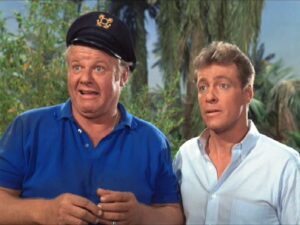A movie star, a professor, a millionaire (and his wife) and a lovable fool band together over a shared goal and go on wacky adventures. Aside from providing the perfect setup to waste a morning binge-watching classic TV, this arrangement of characters also describes every Dungeons and Dragons party ever created. And it reveals a truth about a tricky subject for DND: party formation.
Diverse Party Formation: a Strength and a Weakness for D&D
DND purposely carves out distinct niches for each of its classes. The game’s culture, history, and mechanics encourage players to select a diverse, balanced party. Each character excels at a certain aspect of the game, which gives each player her time to shine.
Diversity is not limited to class. Players select from a wide variety of races and backgrounds. Although some groups may create characters together and purposely select characters with similar backgrounds, this is not a requirement, and many players prefer expressing their creativity by picking an uncommon race or unusual background.
The flip side of extreme party diversity is it stretches the notion of why the characters are working together in the first place. RPGs work best when characters share a common goal in the game world and aren’t simply joining forces because the players are sitting at the same table in the real world. A shared goal may develop organically over the course of the game. Or, in the case of a longtime D&D group, it may not be as necessary, as tight-knit players make up for reluctant characters. But even in such cases, games are improved by a strong, shared goal.
Party Like You’re on Gilligan’s Island
 Which brings us back to Gilligan’s Island. The characters are purposely designed to have vastly different backgrounds, perspectives, and personal goals. They each respond in their own way to being shipwrecked and adopt different approaches to solving problems, all of which makes their interactions and adventures more interesting to watch. But they also share one overriding common goal: they all want to get home. This common goal enables them to put aside their differences and work together, albeit always to see their efforts comically frustrated in the end.
Which brings us back to Gilligan’s Island. The characters are purposely designed to have vastly different backgrounds, perspectives, and personal goals. They each respond in their own way to being shipwrecked and adopt different approaches to solving problems, all of which makes their interactions and adventures more interesting to watch. But they also share one overriding common goal: they all want to get home. This common goal enables them to put aside their differences and work together, albeit always to see their efforts comically frustrated in the end.
Many goals can bind a party together. Often it’s defeating a shared villain. Or working for a shared employer. Or, like the Mighty Nein in Critical Role, the characters may bond as outcasts trying to survive in an unfriendly world.
But if you are looking for a strong shared goal to bind your party together, one that is underused in DND adventures yet good enough for Homer (not Simpson), I recommend the Gilligan’s Island Scenario, wherein the party is trapped in a foreign land and must work together to return home.
Running a Gilligan’s Island Scenario
The Gilligan’s Island Scenario has a lot going for it besides providing a powerful shared goal.
First, this arrangement does not require the PCs to share a particular alignment, faith, or background. Unlike, say, creating the shared goal of completing missions for an adventuring guild, the Gilligan’s Island Scenario doesn’t require that PCs all be down on their luck, or soldiers for hire, or in need of coin. A historian, a dancer, an assassin, and a doctor could all be stranded together and the story would still make perfect sense. With the right players, it may even work with a mix of evil and good PCs.
Second, while the goal of returning home is personally important to the PCs, and they should wish to do so in a timely manner (or at least faster than poor Odysseus), the fate of the world is not (necessarily) at stake. Characters have time to complete side quests related to their backstories without being burdened by the knowledge that every day delayed brings about another city’s destruction.
Third, this arrangement allows each character to pursue the same goal but for different reasons. Each character may have a secondary goal that exists beyond the immediate goal of returning home. Those goals could be played out after the party returns home, extended into a series of epilogues, or even form the basis of the next campaign.
It’s Not all Easy for Poor Gilligan
The drawback of the Gilligan’s Island Scenario is that the world of Dungeons and Dragons is filled with teleportation and divination magic. If Odysseus had taken enough class levels in Wizard or found a mage that offered spellcasting services, his Odyssey would have been condensed down to one trip to the mage’s guild. And in a world with magical scrying and the Sending spell, Odysseus’s wife may have been less inclined to take another husband.
 Of course, the DM could just handwave certain spells, declaring they don’t exist. Or the campaign could be confined to lower levels where the party lacks resources and access to powerful spells. But I prefer the DM trick of establishing a hypothetical scenario--in this case a world where teleportation back to the PCs’ homeworld doesn’t work--and then imagining what brought about that state of affairs. Now, not only do they need to find a new way home, but the PCs probably also want to discover why teleportation isn’t working and what forces--or villains--are responsible.
Of course, the DM could just handwave certain spells, declaring they don’t exist. Or the campaign could be confined to lower levels where the party lacks resources and access to powerful spells. But I prefer the DM trick of establishing a hypothetical scenario--in this case a world where teleportation back to the PCs’ homeworld doesn’t work--and then imagining what brought about that state of affairs. Now, not only do they need to find a new way home, but the PCs probably also want to discover why teleportation isn’t working and what forces--or villains--are responsible.
Sending and Divination magic also can increase narrative tension. The DM can manipulate the information the players receive about the events transpiring on their homeworld, slowly building tension without needing to plan out every detail in advance. By again playing the “what brought about this state of affairs?” game, the DM can create a world where a trickle of ominous information makes narrative sense, and this information can foreshadow and sow the seeds for future plot direction.
If You Could Strand the Party Anywhere in the Multiverse...
...why not make it Sigil, the center of the Outer Planes? Traveling across the planes to return home makes for an epic journey. Moreover, this scenario lends itself well to a Planescape campaign. The setting celebrates diverse parties (Planescape’s vibe has been compared to bars in the Star Wars universe). And, because the PCs needn’t share any alignment or background, they can freely explore or join one of Sigil’s 15 different factions.
But no matter if you strand your PCs in Waterdeep or on a volcano in the Plane of Fire, you have the foundation for a compelling odyssey of how the PCs worked together against the odds to return home.